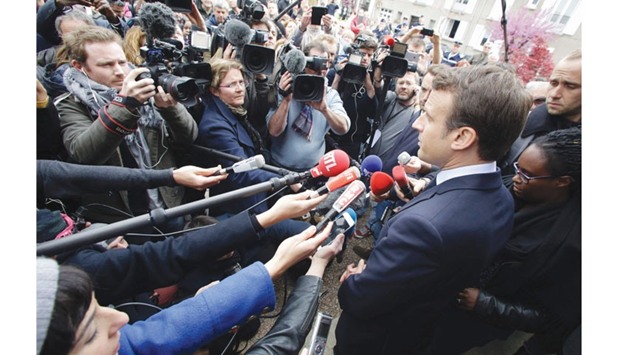France’s war-time past took centre stage in the presidential race yesterday with far-right hopeful Marine Le Pen’s party scrambling to stamp out a controversy over Holocaust remarks while centrist Emmanuel Macron visited the site of a Nazi massacre.
Nine days before the second round of the keenly-watched election, Le Pen’s anti-immigration National Front (FN) was again fighting a furore over a senior official’s reported remarks about the Nazi gas chambers.
On Monday, Le Pen announced that she was stepping aside as FN leader while campaigning for the run-off in order to remain “above partisan considerations”.
Four days later, her stand-in Jean-Francois Jalkh was summarily replaced by Steeve Briois, a popular FN mayor from northern France, after Jalkh was accused of praising the work of a convicted Holocaust denier.
“Mr Briois will take over the interim leadership and there’ll be no more talk about it,” FN vice-president Louis Aliot told BFMTV news channel.
The FN shake-up comes in the midst of a bruising campaign in which Le Pen has attempted to wear down lingering resistance to her party’s tainted brand by portraying Macron as an elitist money man.
Opinion polls give him a commanding lead of up to 20 points over Le Pen in the May 7 run-off but show the gap narrowing slightly after Macron’s sluggish start to his second-round campaigning.
Yesterday German Chancellor Angela Merkel and French football legend Zinedine Zidane joined a long list of politicians, intellectuals and celebrities urging voters to reject the anti-immigration candidate.
“I have absolutely no doubt that Emmanuel Macron will be a strong president if he is elected, as I hope he will be,” Merkel told Germany’s RND newspaper group.
Le Pen, 48, has attempted to woo new voters on either side of the political divide, telling leftists their real enemy is a pro-EU, free-marketeer ex-banker, and conservatives that Macron would continue the policies of the outgoing Socialists and be soft on terrorism.
In a video message yesterday she appealed to the near 20% of voters who backed eurosceptic leftist Jean-Luc Melenchon in the first round to “block” Macron, saying his pro-business programme was “diametrically opposed” to leftist ideals.
“Let’s put our quarrels and divergences to one side,” she said in the message, calling Macron the choice of the “oligarchy”.
Melenchon has refused to explicitly endorse the liberal Macron, breaking with France’s “republican front” tradition of the big parties coming together to bar the FN at the gates of power.
An Odoxa poll yesterday showed 40% of Melenchon’s supporters would back Macron, 41% would abstain and 19% would vote for Le Pen.
Melenchon’s spokesman Alexis Corbiere rebuffed Le Pen’s advances, telling supporters: “Not one vote should go to the National Front.”
Le Pen has presented the battle as a “David versus Goliath” contest between “patriots and globalists”.
But as Macron visited a village where Nazi troops massacred 642 people during World War II, Le Pen’s team attempted to shrug off the latest in a long line of controversies over remarks by party officials about the Holocaust.
Jalkh is accused of praising the work of convicted Holocaust denier Robert Faurisson in an interview for a 2005 article in a French academic journal.
“What I’m saying, and what really surprised me, in the work of a genuine negationist or revisionist ... is the well-worked, rigorous nature of the argument put forward,” Jalkh, 59, was quoted in the article as saying.
“We condemn this type of remark and he denies (making) them,” the FN’s Aliot said.
Le Pen has sought to purge the FN of the anti-Semitism that was its trademark under her father, FN co-founder Jean-Marie Le Pen.
In 2015 she booted her father out of the party for repeatedly calling the Holocaust a “detail” of history but this month was herself criticised for saying that France bore no responsibility for the round-up and deportation of French Jews during the war.
Macron has warned that a vote for Le Pen – who wants to build up France’s borders, take France out of the eurozone, and hold a referendum on France’s EU membership – could lead to conflict.
“To not remember is to repeat the mistakes of history,” he said during a visit to the village of Oradour-sur-Glane, the site of the worst Nazi atrocity in France.
Macron and Le Pen, both of whom campaigned as political outsiders, swept aside the candidates of the mainstream left and right in the April 23 first round.
Le Pen followed in the footsteps of her father who also made it through to the presidential run-off in 2002.
His qualification triggered an outcry, with voters rallying en masse behind his opponent, conservative Jacques Chirac in the run-off.

Macron speaks to the press during a campaign visit to the ruins in the village of Oradour-sur-Glane, France.
